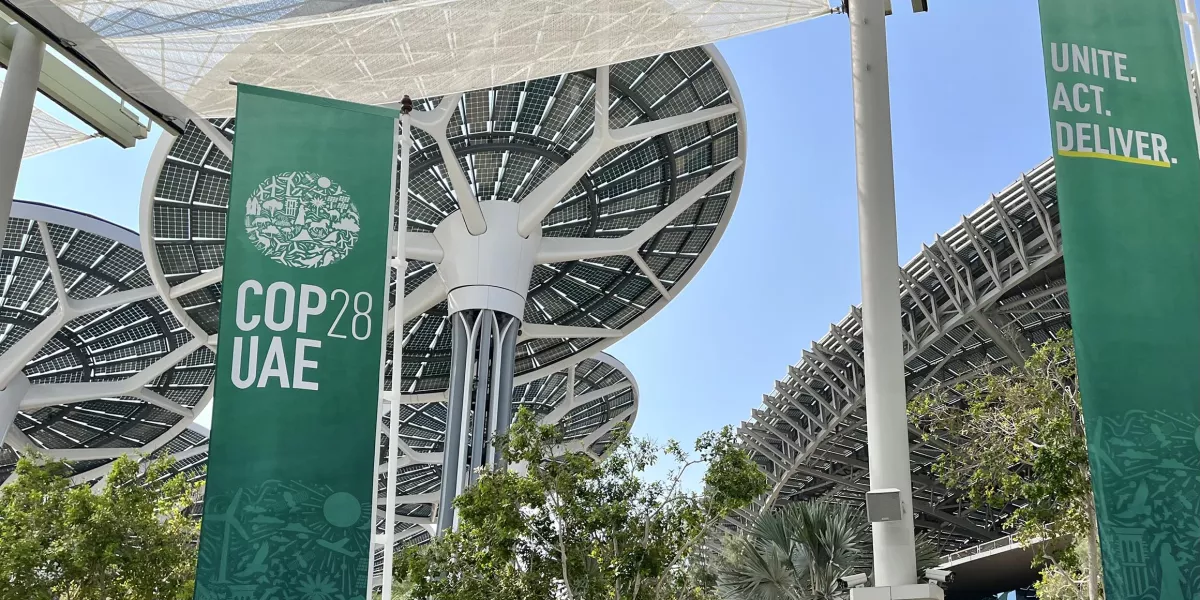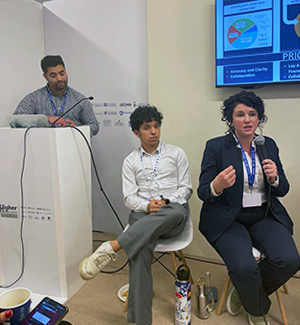
A Penn State World Campus student attended the United Nations’ conference on climate change in Dubai late in 2023 and is inspired to do her part to take action in her community.
 Olivia McMahon, of Nazareth, Pennsylvania, was part of the Penn State delegation at the United Nations Framework Convention on Climate Change’s 28th annual Conference of Parties, or COP28, from November 30 to December 13, 2023. The annual conference brings governments from around the world together to formalize agreements on addressing the climate change crisis, from reducing emissions to adapting to current and future impacts.
Olivia McMahon, of Nazareth, Pennsylvania, was part of the Penn State delegation at the United Nations Framework Convention on Climate Change’s 28th annual Conference of Parties, or COP28, from November 30 to December 13, 2023. The annual conference brings governments from around the world together to formalize agreements on addressing the climate change crisis, from reducing emissions to adapting to current and future impacts.
The week after McMahon returned from Dubai, she graduated from Penn State with a Bachelor of Science in Energy and Sustainability Policy that she completed online.
At the conference, McMahon gave a presentation about her contributions to the Bucks County, Pennsylvania, Planning Commission’s Local Climate Action Program in 2022 and 2023. McMahon and another student, Jonaid Lone, completed greenhouse gas emissions inventories for the county and its government operations. Then, for the capstone project that was a requirement for her major, McMahon continued to work with Bucks County to help them in their planning to reduce emissions.
The impact of youth and local climate action
McMahon’s presentation was part of a panel discussion on how youth and universities can foster solutions to counter climate change.
“Climate change is not distant — it’s happening now,” McMahon said. “Local climate action really matters and will be a key to addressing the climate crisis. That was a theme throughout the conference.”
McMahon attended panels about the built environment, or what is made by humans, that focused on construction techniques, energy efficiency measures, and city planning practices that have lowered emissions in places across the world. She said speakers from the European Union, Africa, Australia, Asia, South America, and the U.S. all stressed the important role local governments play in putting these initiatives into practice.
“Many of the presentations referenced plans like those that are developed by the Penn State Local Climate Action Plan,” she said. “Panelists stressed that because local officials have an intimate understanding of challenges in their communities, they are able to structure plans that increase chances of success not only to draw down emissions but also create economic opportunity and improve the quality of life for their citizens.”
Another panel reinforced the importance of local climate action affecting national policy. She said Nathan Hultman, a professor and the director of the Center for Global Sustainability at the University of Maryland, talked about how local, regional, and state efforts can lay the groundwork for federal policy.
McMahon heard firsthand about the effects of climate change
McMahon also witnessed negotiations between countries over phasing out fossil fuels and adapting to new energy sources, and she attended sessions about how climate change is affecting different parts of the world.
“It was mind-blowing and fun, but it was also hard and heart-breaking,” McMahon said.
McMahon said delegates from Pakistan described devastating flooding and how even limiting global warming to 1.5 degrees Celsius, or 2.7 degrees Fahrenheit, could still have devastating effects on the cryosphere, or frozen parts of the planet. McMahon also heard from heads of state, business leaders, and international delegates about the critical role people can have in taking action to address climate change in their local communities.
“It was an eye-opening experience,” McMahon said. “The whole world was there. It’s inspiring that the world can come together and work on a problem.”
After returning from her trip, McMahon was interviewed about her experience by news media in her community.
A recommendation from her adviser
Brandi Robinson, an associate teaching professor with the Penn State College of Earth and Mineral Sciences, was McMahon’s faculty adviser and recommended her as a student delegate.
“When I found out we had the opportunity to send a student to COP28 to discuss universities fostering solutions to climate change, Olivia was the first student from our Local Climate Action Program to come to mind,” Robinson said. “Across her three semesters of engagement with Bucks County, Olivia consistently demonstrated the curiosity and emerging expertise to translate her passion for addressing the global climate challenge to practical solutions at the local level in Pennsylvania.”
Learn more about the Penn State energy and sustainability policy program that is offered online through Penn State World Campus.
Media Contact:
Mike Dawson
mdawson@psu.edu
